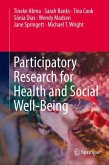The relationship between health, social care, and the teaching of disciplines such as sociology, social work, and social policy are increasing in many regions worldwide. This book explores the relationship between wider social theory and social welfare though an understanding of how power and resistance impinges on how helping professions operate in health and social spaces in the twenty-first century. The book presents a critical analysis of major Foucauldian theories and social issues in the construction and practice of health and social welfare. It discusses important theoretical and substantive contributions to current debates and presents an engaging, comprehensive, and innovative perspective to address both how power and resistance shape the way we live and how the way we live shapes the way in which we understand social relations among professionals, policy makers, and user groups in comparative contexts. The purpose of this book is to critically inform debates concerning the abstract and empirical features of health and social care examined through the lens of innovative theoretical perspectives emanating from Foucauldian theories.
"This book explores the relationship between health, social welfare and social policy, critically examining the abstract and empirical features of health and social care in relation to Foucauldian theory, and makes important theoretical and substantive contributions to the current debate. ... this book presents an engaging, comprehensive and innovative perspective to explore how power and performativity shape the ways in which social relationships between professionals, policy makers and user groups in health and social care." (Yongjin Wang, European Journal of Social Work, November 24, 2023)








